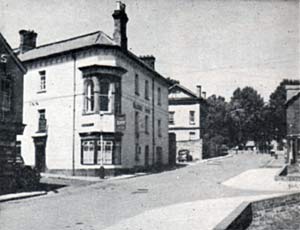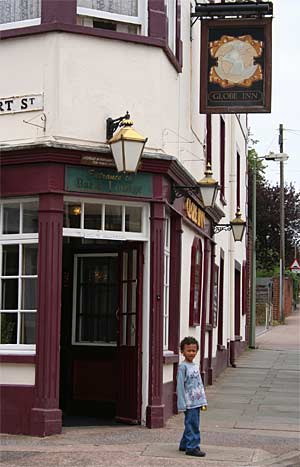
Globe Inn - Newtown
Page updated 6th January 2024
Located in Clifton Road, Newtown, about 100m from the Golden Lion. The Globe is a popular name for hotels and public houses in southern ports as it was the sign used to indicate a Portuguese Wine Trader.
The Globe Inn at Newtown dates from the mid 19th-century, and one Thomas Dare was listed as landlord in 1844; Dare appears to have become the landlord of the Falcon Inn in Lower North Street by 1848. The first mention in the Flying Post was in October 1848 when an advert for a property sale appeared for "Mr Robert Bristow, Globe Inn, Newtown, St Sidwell's Exeter, (the Owner)." A year later and a to let notice appeared for a "Small Public House. For particulars enquire at the Globe Inn, New Town, Exeter."
Nicholas Lamacraft is first mentioned in the Flying Post as a maltster of 17 years experience in 1855. He and his son Harry would become most influential of the landlords of the Globe Inn. He took on the inn in 1856, and Harry would still be running the place after the First World War. An advert, in 1858, requested brewers and maltsters to apply for a position for Lamacraft's Globe Inn. The Globe was transferred to Harry, the year after he married in 1878 to Miss Watkins of Okehampton, a marriage that would provide Harry with two daughters.
Inquests
The common practice of holding inquests in public houses applied to the Globe with the first recorded inquest in March 1859 when 76 year old Elizabeth Stump's death by accidental burning was recorded. Probably the most poignant inquest was in August 1860 when two 14 year old boys, William Bull and Frederick Channing in the employ of Mr Mason at the brickworks, became trapped in the mud at the bottom of a 5 ft deep pool at the works and drowned. There were other inquests, of which, the last recorded was in 1880 when Florence May, nine months old, died of measles.
... and Property Sales
The other popular function of inns in the 19th-Century was as a venue for sales, especially of property. The building boom in Newtown started in the 1840s, just when the Globe Inn opened. Initially, sales of land and property in the area were held in public houses in Sidwell Street, most notably the Duke of York.
The Globe Inn became the regular venue for sales in Newtown in the 1860's through to the 1890s, as land sales for building and speculative development flourished; the nearby Golden Lion must not have been suitable for hosting sales, as only one advert, in the 1890s, for an auction can be found in the Flying Post.
The first sale advert mentioning the Globe Inn was for nine lots of cottages in John Street and Clifton Street, sold in September 1866. Many of the new houses were constructed from bricks manufactured at the Workhouse Works nearby, and some have decorative brick features reflecting the pride of the works output.
Other property sales at the Globe Inn were in 1868 with a newly built freehold property in Parr Street, several sales in 1869, more property in Summerland Street in 1871, 21 building sites and dwelling houses including 8 building plots in John Street which were purchased for £175 and more plots in Belmont Road. After Nicholas Lamacraft transferred the Globe to his son Harry, he invited tenders to erect five houses in the area in 1880, adding to the building bonanza. It is possible to trace the development of a large part of Newtown through the sales at the Globe Inn.
In September 1872, there was a meeting of disgruntled ratepayers at the Globe, objecting to some proposed improvements to Bedford Street; the rate was 1s 7d in the pound and was due to rise to 2s, a rise of something like 30%, and the meeting felt that the increase was partly due to such unnecessary improvements - and we complain about our Council Tax. Nicholas Lamacraft was also criticised in the Western Times for assisting a Conservative to be elected in Plymouth (on behalf of the Licensed Victuallers) in 1874, and he was involved on the periphery of local politics.
Some of the landlords listed in trade directories (italics) and notice of sales are:
1844 - Globe -
Clifton Rd, Thomas Dare - Pigott's
1854 - Notice of sale from Mrs Moxam to William Birkett - Flying Post
1856 - Report of sale (let?) to Mr Lamacraft - Flying Post
1867 - Notice of sale from William Birkett to W E Carter - Flying Post.
This was probably a change of owner, rather than landlord.
1871 - Lamacroft, w, globe inn, maltster, newtown - Pocket Journal
1878 - Globe, Albert St, Nicholas Lamacraft - White's. The licence was
transferred to his son, Harry Lamacroft in the same year.
1897 - Globe inn, Harry Lamacraft, Clifton road, Exeter - Kelly's.
1906 - Globe, Harry Lamacroft 38 Clifton Road - Besley's
1919 - Globe Inn, Harry Lamacroft, 39, Clifton Road - Kelly's. They
also brewed their own beer at this time.
1934 - Globe, Connell, H,. 39, Clifton rd - Besley's
1956 - Globe Inn, Stanley W Cutting - Kelly's
The Globe was lucky to survive the bombing of 1942, as Newtown was badly hit. Stan Cutting, who ran the house in the 1950s, along with his wife Jess, was a retired footballer who had been with Exeter City for 14 years; he moved on to run the Crown and Sceptre (City Gate). The Globe closed in July 2019.
 Globe
Inn, Newtown during the 1950s.
Globe
Inn, Newtown during the 1950s. The sign for the Globe Inn hangs
outside.
The sign for the Globe Inn hangs
outside.
│ Top of Page │